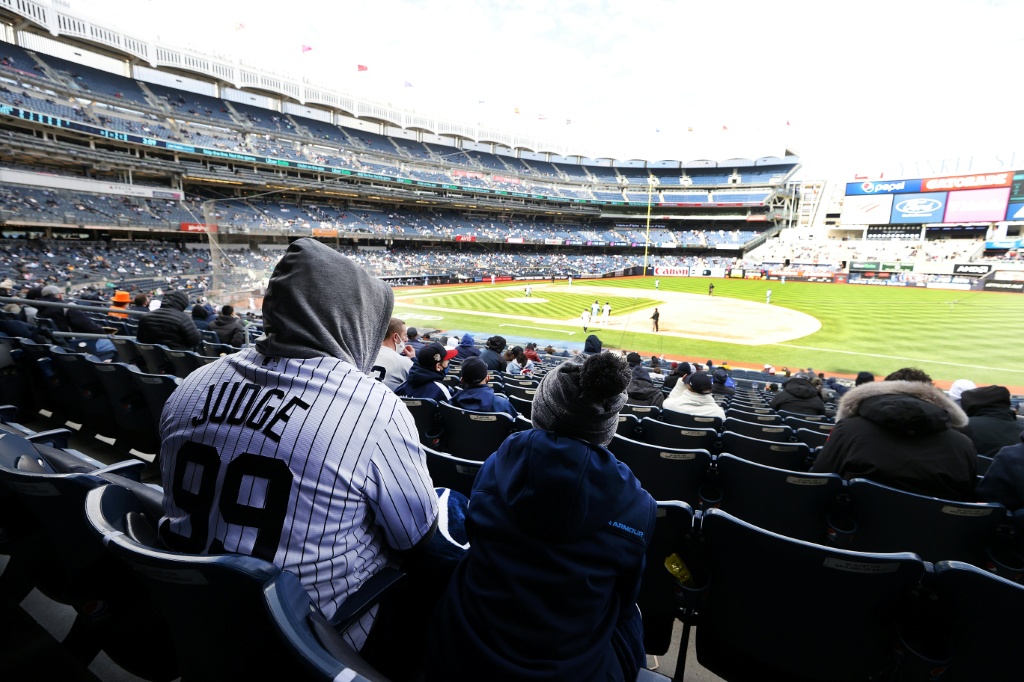Baseball season is finally here, but the pandemic is still on the mound. 2021 marks the second year these two have met, and the odds aren’t as drastic for the ballplayers as last year — some fans have been allowed back in the stands, thanks to rising vaccination rates. Still, rising case numbers, multiple variants, and a patchwork of local ordinances stand in the way of traditional normalcy. Here’s what to expect during the season.
Covid and Sports
2020 reshaped sports and gave us some of the most valuable case studies in Covid-19 containment, from the NBA’s zero-case bubble in Disney World and NHL’s hub city campuses to home city plans by the MLB and the NFL . The CDC even partnered with the NFL for a full analysis of the NFL’s fall 2020 season. Not all efforts were successful– a single high-profile lapse at the end of the World Series brought the LA Dodgers five cases.
How players and staff stay safe
Individual teams are responsible for their own Covid-19 action plans, but there are some standards set out by the MLB. Teams will have their own Infection Control prevention coordinators, compliance officers, facemask enforcement officers, contact tracing officers, and contact tracing working group in addition to medical staff.
The main protection measures are frequent testing, isolating people who test positive, and taking precautionary measures to minimize exposure inside and outside the league.
When at club facilities, face coverings and contact tracing tags will be worn at all times to detect potential exposures. Anyone who tests positive will isolate for at least 10 days, while close contacts will have to isolate for 7 days and test negative on day 5. These rules are being taken seriously, and they’re already having an impact — the Nats had 5 players and a staffer miss opening day.
Outside league events, the players are required to observe strict guidelines based on CDC recommendations. They’ll initially only be prohibited from going to indoor gatherings and public venues like restaurants, theaters, and gyms. As the full season starts and teams travel, their bubble will contract until the Championship Season, when they will be isolating at their hotel except for a handful of team and exercise-related exceptions
There will also be modifications to game rules, which can be found here.
ESPN reports that players and field staff will enjoy loosened restrictions once their team reaches 85% vaccination, allowing them to gather indoors, congregate maskless among other vaccinated people, and travel more freely.
What you’ll find at a game
For starters, a lot fewer fans. The specifics will vary from state to state and city to city, but it’s a safe bet that most stadiums (with some notable exceptions ) won’t be holding their usual capacity. For an example, we’ll look at the rules for attending a Phillies game at Citizens Bank Park.
You won’t be getting close to the players — they’re strictly prohibited from having direct contact with fans, and no fans will be allowed within 12 feet of the dugouts or ballpen.
You’ll have to wear a face covering to get in, and they can only come off when actively eating and drinking — and only in your seat. Tailgating is a no-go in Philly this year, though rival Dallas will allow tailgaters in specific, socially-distanced spots.
To facilitate social distancing, fans will be assigned specific entry gates on their tickets and allowed to sit in pre-arranged pods. Variations of this plan are in place at many stadiums across the country.
What you may not need, according to a memo reported by the LA Times , are Covid-19 tests or vaccinations. Those requirements will be left to local authorities and will vary based on location. The Phillies and Cowboys, for instance, aren’t requiring either. To attend a Yankees or Mets game, on the other hand, you’ll need one or the other.
There’s a long list of terms and conditions attached to buying a baseball ticket, and now there are Covid-19 related ones, too. The full list can be found on the MLB site.
What if I am vaccinated?
It’s not likely that much will change for vaccinated fans. CDC guidelines still require masking and social distancing in public even after receiving a vaccine, and it’s unlikely that many stadiums will relax those rules. Vaccinated people may have some small perks, though, like the aforementioned waiving of Covid-19 tests before Yankees and Mets games.
The future
MLB commissioner Rob Manfred, on the MLB website, said he is hopeful that full stadiums will be the norm later this year. “I hope by midsummer that we have ballparks that are unrestricted and we have full-fan access.”
It’s a nice vision, but perhaps an overly optimistic one as cases rise across the country and experts warn of further waves.
“We’re an outdoor sport,” Manfred continued, “I think it’s safe or safer to go to outdoor activities. Everybody seems to agree on that. And I think that there’s pent-up demand for entertainment products, and we’re going to do everything we possibly can to … to take advantage of that.”
Sean Marsala is a health writer based in Philadelphia, Pa. Passionate about technology, he can usually be found reading, browsing the internet and exploring virtual worlds.

















You must be logged in to post a comment Login